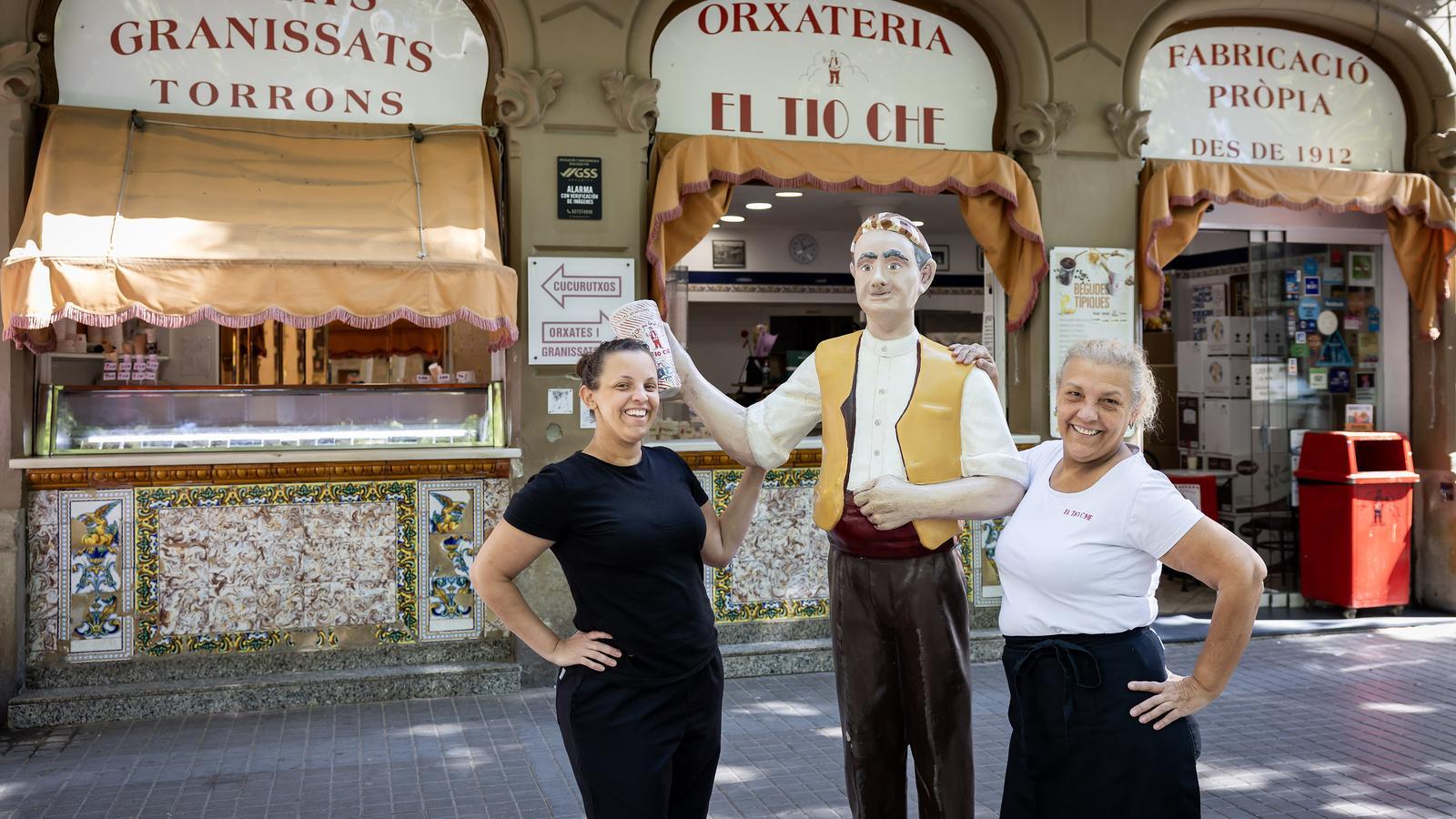Tio Che: They missed the boat and gave Barcelona a century-old horchatería
On Rambla del Poblenou, this establishment has been defending the best Valencian tradition of horchata, fartones and granitas for more than a century.


BarcelonaMore than a century ago, many people thought that the promised land lay across the ocean, whether in New York or Buenos Aires. Juan and Josefa, a couple from the town of Nucía, in Alicante, believed it. Low-paid, with few rights and a hard life, they decided to save up to travel to Barcelona to board a boat. But they ended up putting down roots in Barcelona, without boarding a boat. "God knows what happened? It seems the boat took so long to arrive that they ended up in Barceloneta. And they had to get by, what could they do? Horchata!" says Teresa Moreno, great-granddaughter of Joan and Josefa. Her daughter Irene, the great-great-granddaughter, listens to the conversation while serving customers at the El Tio Che horchateria, one of the oldest in Catalonia thanks to that lost boat. Juan went around looking for customers shouting "Che, try this horchata!", so naming the business was very easy.
Spending an hour on the terrace of El Tio Che on the Rambla del Poblenou is wonderful. One moment a couple in love passes by, and then a expado A Canadian who, until a year ago, had never tasted horchata and now can't live without drinking it. Now a 92-year-old woman arrives with her caregiver, walking slowly. "She's been coming here all her life; I've seen her family grow up. We're a proud business because our customers have been coming here for generations," says Teresa at the corner of Rambla del Poblenou and Carrer del Joncar. The business was founded in 1912 on Passeig Joan de Borbó, but later moved to Poblenou. "Barceloneta was unsafe back then, during the demonstrations. They made my grandfather go and identify the corpses of neighbors when there were strikes. And they came here, first to Carrer Wad Ras, which is now called Doctor Trueta. They settled in a building that was destroyed by bombing during the Civil War." They had the evil one, Teresa. Tio Che hasn't moved from that corner where there used to be a very popular brewery where Júpiter, the historic football club from Poblenou, was founded.
From beers, they moved on to horchatas and fartons. A winning bet, because in the neighborhood, it's still one of the most beloved businesses. A Poblenou that's changing a lot, with tourist apartments, and where many foreigners have discovered that life is good. "We've gone from being a working-class neighborhood to a trendy one. Now La Rambla isn't what it used to be, businesses advertise everything in English, the soul has been lost. But many people who come from abroad end up discovering us," they explain. Some simply see a queue and stop by out of curiosity, not quite knowing what to order when their turn comes. When a foreigner becomes a customer at El Tio Che, it means they've integrated into Poblenou. An unwritten law that never fails.
Certified tigernut
The fifth and sixth generations run a business that hasn't lost contact with Nucia's family to guarantee the quality of the product, made with tiger nuts certified by the Chufa de Valencia Designation of Origin. "When they pick them, they dry them. And we take the highest quality, the ones with the highest weight. We buy them in 25kg sacks. And when they arrive, we soak them for 24 hours, disinfect them, and then do three more washes. The liquid comes out in one corner and the pulp in the other. Then you have to strain it, add sugar... it's a long, careful process. My father goes down to work at six in the morning to get everything up and running," says Irene.
When the weather is nice, the lines are very long. People want horchata, granitas, or Valencian classics like barley water. Or Cuban, which may vary depending on the site. "Our Cuban "It's meringue milk with a scoop of ice cream," they explain. Or turrones, because they started making them in 1997. Since they have roots in Alicante, it was a logical decision. "We also used to have a Frankfurter in the shop next door, but in 1992 it was complicated. With the Olympic Games, people didn't go out on the street; they watched everything on television. We didn't have work. So we started making takeaway glasses of horchata, which was a novelty back then. It saved us. Then the Frankfurter closed, and we decided to make turrones at Christmas. But we thought... don't you have a cold beer in the winter? Why not a horchata? And it was a success. Now we make horchata all year round; you can take home turrones and horchata on the same day," says Teresa.
And ice cream too. In 2021, Irene opened an ice cream shop next door where she creates flavors at the request of customers to create emotional bonds with them. "Ice creams of memory. I have a form where people can tell us where they come from, they can tell us about their grandmother, a town... and we make ice creams that move them. With the taste of grandmother's cooking or the land where they were born. I transform their memories into ice creams, and like a neighbor who remembers roasting almonds over a wood fire as a child... Well, we look for those flavors. Or with a neighbor from the United States, the flavor of the sauce for the barbecue meat that they miss." Or neighbors inspired by Poblenou institutions or its festivals.
The key is to create memories, whether with ice cream or a horchata in hand. "There's a man who used to come every year to make a horchata." with his wife to remember the day he asked her out here, at the restaurant. Now she's gone, but he comes back alone. We've seen relationships and children grow, we've seen people from the neighborhood, and Mario Vargas Llosa also came. The same thing happened to us with him as years later with Joan Plaza, the basketball coach. In both cases, we didn't know who they were, and they seemed like friendly customers, and one day on television... they appeared and we recognized them," jokes Teresa, who gets along well with the city's other historic horchaterías, such as the Valenciana on Aribau Street, the oldest of all, founded in 1910 for the same reason: Severino Cortés and nougat. "There's no bad relationship because each horchatería was rooted in a neighborhood, in an area. "It's nice not to be alone," says Teresa, who celebrates the day they were able to buy the premises where they currently stand. This way, they don't live with the fear that other historic businesses will raise their rent and force them out of a city with a long tradition of horchata. Thanks to those who came from La Nucía or Jijona more than a century ago looking for a new life.
